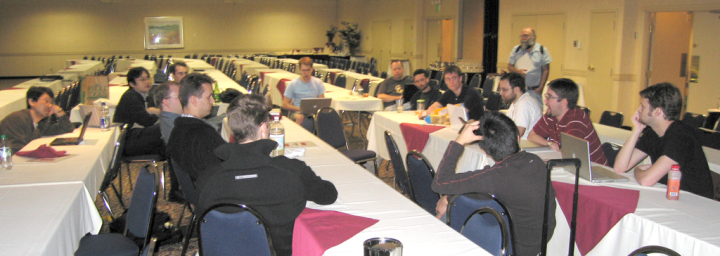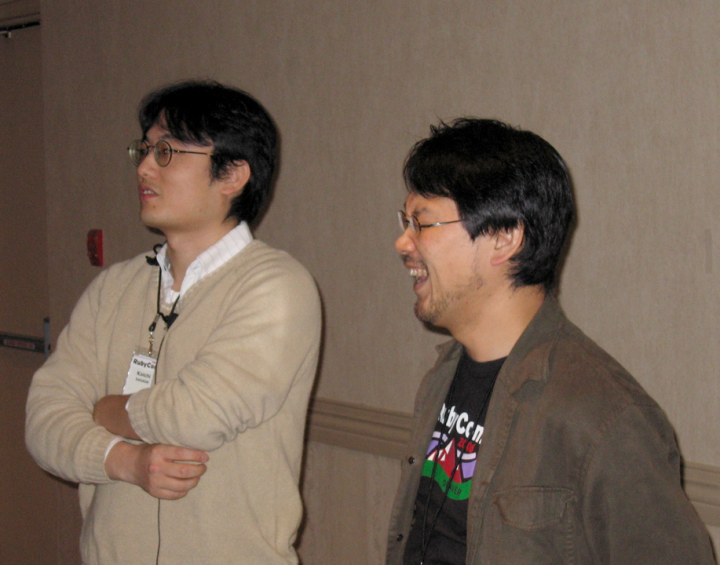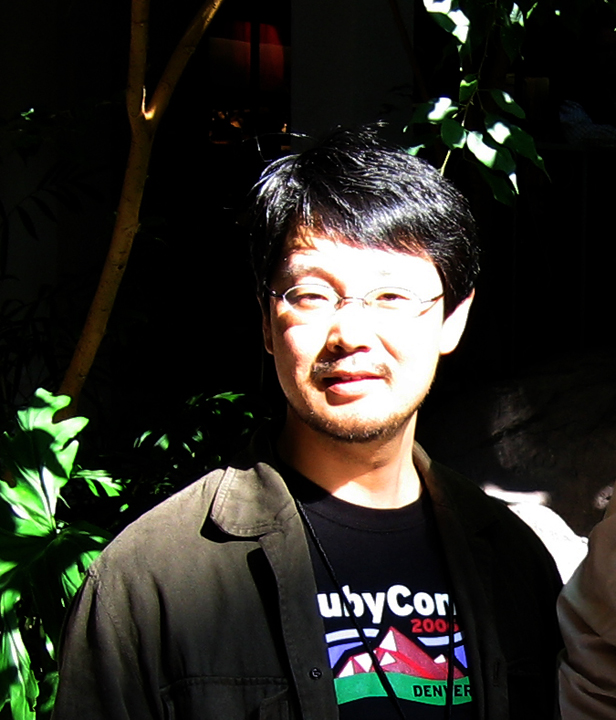
I spent Friday through Sunday at RubyConf in Denver; a small, friendly, educational gathering. The Ruby community is nice, and I’ve already praised the technology enough; but the future is a bit opaque.
There are people here older than me—a handful. It’s a fairly standard-feeling OSS crowd. Ruby has a serious demographic problem, pervasive in high-tech but worse here: there aren’t any women (maybe five among the 300 or so attendees).
The conference hotel’s appearance is much-improved by a little indirection.
The tech culture is Mac-heavy and text-heavy; a lot of talks started with one or two creamy-smooth glamorous Keynote slides then switched into command-line windows where the presenter interacted (live or recorded) with the system. Even the regular prize draws (for books) were accomplished by a 3-line on-screen Ruby script that selected a random record out of a YAML file of the attendees.
I can’t say enough good things about Chad Fowler, Rich Kilmer, and David Black, the Ruby Central guys who made it all go.
The Big Story · Let’s start with a picture.
Above, you see the Ruby Implementors’ summit. Pardon the awfulness of the shot; whatever skill it takes to get decent-looking interior shots in dark rooms with a flash, I don’t have it.
“Implementors’ Summit?” you ask. No, these aren’t just the people working on Ruby the program; these are the people working on alternate/future versions of it, including JRuby, RubyCLR, Rubinius, YARV, Cardinal (Ruby on Parrot). If Ruby is a good language (it is) and people like using it (they do), why is all this going on? One reason is that Ruby, compared to the competition like Python and Perl, is kind of slow. Obviously, there are lots of applications, like the kind Rails builds, where the bottlenecks are the Web and the database and so on, and Ruby doesn’t get in the way, but there are other applications where the performance really is a problem. While there’s another version of Ruby coming along to address this, there’s still a lot of interim concern. It looks like one substantial win came out of the meeting: an agreement to work to aggregate and share test suites across all the implementations.
There are a couple of other perceived problems with the current version of Ruby; its lukewarm support for Unicode and the general weakness of its built-in XML parser (for which, fortunately, there are alternatives). So there is hunger for fresh new versions of Ruby.
The Mainstream · There is a fresh new version of Ruby coming, to be called Ruby 2.0. It’s being designed mostly by Matsumoto Yukihiro, the inventor of Ruby, universally called Matz. It will feature YARV, a new virtual machine, being built by Sasada Koichi (his online handle is “Ko1” which is funny if you know a little Japanese).
Koichi and Matz.
The problem is that Ruby 2 is not expected much before Christmas 2007.
Matz · He is cheerful, thoughtful, and charming; he provides fairly eloquent leadership of the Ruby community even though he has to shout across the notoriously-difficult Japanese-English language chasm.
His keynote used the familiar bikeshed-at-the-powerplant meme in a fresh new way (“Let’s turn all the Ruby 2 design problems into bikeshed problems”). He acknowledged the pressure for a new and better Ruby, but clearly it’s not bothering him very much; Ruby will be done in late 2007 and that’s when it’ll be done and that’s that.
His centeredness and calm has a Buddhist feel (actually, he’s Mormon). I’m not 100% sure he really understands the intensity of the language fermentation he helped launch, now propelled by PHP and Rails and TDD and loss of patience with frameworks that feel too big and heavy and languages that feel too verbose and persnickety. On the other hand, perhaps Matz just doesn’t see it as his problem; he’s concerned with shipping a beautiful and useful tool, not with what the Western business world sees as opportunity costs.
As of now, Rails continues to grow its fan base, Ruby books sell like hotcakes, and a surprising number of developers here and there around the world are just quietly using to Get Shit Done. Almost anywhere you are, there’s a Ruby Users Group or a Ruby Brigade meeting monthly.
Right now, I think it would be good for Sun and good for the Java community and good for the industry if a whole lot more developers started looking seriously at Ruby , either standalone or on the JVM. I’m making that case a lot, and it would be an easier case to make if I didn’t have to acknowledge Ruby’s performance and Unicode issues. But those of us making that case are having an impact anyhow.
Maybe Matz is right.
And anyhow, with all these alternate-implemenation projects under way, I’d say Ruby’s bets are pretty well hedged.
The Rest of the Conference · I’d write it up but there’s no need; Curt Hibbs has aggregated the blogs and Nick Sieger is capturing the whole thing blow by blow. My favorite talks were Laurent Sansonetti from Apple on using Ruby to automate OS X (No more AppleScript! Yay!), Nathaniel Talbott on Open Classes, Open Companies, and Zed Shaw on Fuzzing, if only because of his minimalist gonzo slides, including a full-motion full-colour ASCII-art Japanese rock video; something you don’t see every day.




Comment feed for ongoing:
From: Robert Sayre (Oct 23 2006, at 01:22)
I'm not sure fuzzing requires scare quotes anymore. We use a fuzzer to test the JS interpreter now, and one of our top hackers says fuzzers beat static analysis. He did his PhD in static analysis, so that is saying something.
Jesse's JavaScript compiler/decompiler fuzzer
-
https://bugzilla.mozilla.org/show_bug.cgi?id=349611
[link]
From: Mark Levison (Oct 23 2006, at 06:32)
I've nothing useful to add about Ruby - but as to taking pictures indoors and getting a better background. There I have some practice. Without carrying a brace of expensive lighting equipment I think you did a pretty good job. Here are the tricks I use: While still using the flash to light the subjects, lower the shutter speed. You might get away with a shutter speed that's half reciporical of the focal length (so 1/30 sec when the focal length is 60mm, 1/15th of a second at 28mm etc). If the flash supports it use rear curtain shutter synch (all movement will look natural that way). Lean against a wall or post - to minimize camera shake. Finally in post process I might play around with the white balance and see if I could pull any more details out of the shadows.
[link]
From: Jeremy Zawodny (Oct 23 2006, at 06:53)
Thanks for the write-up, Tim. I've spend a fair amount of the last week looking at Ruby and Rails. It took a bit of time, but I think I finally "get" Ruby--and I like what I see.
[link]
From: Takashi Shitamichi (Oct 24 2006, at 20:12)
Your wrote: "Ruby has a serious demographic problem, pervasive in high-tech but worse here: there aren’t any women (maybe five among the 300 or so attendees)."
I think so! But not only in Ruby but also in other Software/Opensource/Web2.0 world. In the past, I wrote an entry about it at my blog because there was Top-8-ranked translated article of http://business.newsforge.com/article.pl?sid=06/06/15/2054202 at an online media in Japan.....
[link]
From: M. Edward (Ed) Borasky (Oct 28 2006, at 19:26)
"There are people here older than me—a handful. It’s a fairly standard-feeling OSS crowd. Ruby has a serious demographic problem, pervasive in high-tech but worse here: there aren’t any women (maybe five among the 300 or so attendees)."
Just about every issue of the ACM TechNews I get in my email three times a week has an article about the low numbers of women in IT in general. I never really took that seriously; everywhere I've ever worked had a significant number of women in both high-level development and managerial roles. There are regional differences -- a higher percentage of women in those roles in New York and Maryland than in Oregon, for example. And the business cycle certainly has an effect as well.
But five out of 300? I can't think of a rational explanation for numbers that low. And I'm unwilling to even propose a conjecture. So to be provocative, let me ask, "Yes, it's a phenomenon, but is it a problem? And if it's a problem, for whom?
[link]
From: John Cowan (Oct 29 2006, at 12:53)
Ed Borasky writes:
<i>Everywhere I've ever worked had a significant number of women in both high-level development and managerial roles. There are regional differences -- a higher percentage of women in those roles in New York and Maryland than in Oregon, for example.</i>
I've spent all my working life in New York City, and the scarcity of female developers is huge. Fairly recently I was part of a group of sixty developers, two of whom were female. Right now I'm not sure of the total numbers (my employer seems to treat tables of organization as secrets from the employees), but there is to my knowledge only one female developer (another may be somewhere in the cube farm out of sight). The head of IT is female, but, as the saying is, equality is not when a female Einstein gets tenure, but when a female shlemiel advances as fast as a male shlemiel.
<i>But five out of 300? I can't think of a rational explanation for numbers that low.</i>
Two obvious explanations are barriers to entry and selection effects.
<i>So to be provocative, let me ask, "Yes, it's a phenomenon, but is it a problem? And if it's a problem, for whom?"</i>
It's a problem for everyone, for at least three reasons:
1) Lots of useful female brains and insights aren't contributing, whether excluded or self-excluded. We need all the brains we can get.
2) Diversity is good, because conflict (not amounting to warfare) between multiple viewpoints is helpful at both design and implementation levels. Excluding women automatically excludes a major, cheaply available source of diversity.
3) All-male or nearly-all-male organizations easily become self-perpetuating boys' clubs that readily fall into pathological organization structures, most notoriously "Choose an alpha male, then do whatever he says, no matter how crazy it is." Women tend to be less likely to put up with this: G. B. Shaw actually went so far as to say that he thought having lots of women in legislatures was much more important than female suffrage in an age that had neither. I shudder to think what he would have said about today's nearly-all-male governments after almost a century of universal adult suffrage.
[link]
From: M. Edward (Ed) Borasky (Oct 29 2006, at 23:46)
"The head of IT is female, but, as the saying is, equality is not when a female Einstein gets tenure, but when a female shlemiel advances as fast as a male shlemiel."
That's the sort of comment that makes me cringe. Maybe I'm an old fogey (a few years older than Tim Bray, anyhow), but I don't consider advancement of shlemiels of any gender, race or age an indication of equality. It's more an indication of a lack of alertness than anything else.
"Two obvious explanations are barriers to entry and selection effects."
I don't see how there can be barriers to entry. How are such barriers set up? Do you actually know of people who were barred from entering the world of open source because they were female? Or Hispanic? Or African-American? Or, to put a more personal spin on it, because they were over 60?
How exactly does one get barred from a "philosophy" of software development that values contributions? Nobody has ever told me *I* can't contribute to open source. There are some things I have to be careful about, of course.
"It's a problem for everyone, for at least three reasons:
"1) Lots of useful female brains and insights aren't contributing, whether excluded or self-excluded. We need all the brains we can get."
If women are *being* excluded by men, yes, that's a problem. But if women are excluding themselves, they must have good reasons for it. If they are free to contribute, they are also free to choose not to.
It's somewhat like the "Employment At Will" clause in most employment contracts. Your employer is free to terminate you at any time and does not in fact need to tell you or anyone else why.
As I said earlier, I can't come up with a rational explanation and I'm unwilling to propose a conjecture. But I would say it's highly more likely that women choose not to contribute to open source projects. And they don't need to tell me or anyone else why they choose not to contribute.
"2) Diversity is good, because conflict (not amounting to warfare) between multiple viewpoints is helpful at both design and implementation levels. Excluding women automatically excludes a major, cheaply available source of diversity."
Well, first of all, I see plenty of conflicting viewpoints in the mostly-male open source world. I see constructive conflict and destructive conflict, and I see it at all levels.
Second, you're presupposing that women are being excluded by men, aren't you? I'm not sure there's any evidence for that. And finally, I don't think referring to women as "a major, cheaply available source of diversity" is either politically correct or factually correct.
"3) All-male or nearly-all-male organizations easily become self-perpetuating boys' clubs that readily fall into pathological organization structures, most notoriously "Choose an alpha male, then do whatever he says, no matter how crazy it is."
I've seen little evidence of this in the open source communities I hang out in. There are "benevolent dictators" like Matz, Guido van Rossum and Linus Torvalds, of course. But the whole open source philosophy is a "crazy idea". It can't possibly work -- thousands of talented professionals and amateurs spending their nights and weekends building high-quality software and giving it away? How can that possibly work?
But it does. And apparently it is a "guy thing". Maybe that's it ... women avoid open source for the same reason they find other things to do when their husbands are glued to the TV and beer during the pro football season here in the USA. :)
[link]
From: John Cowan (Oct 30 2006, at 07:31)
Y'know, I really considered writing "(or as slowly)" after "advances as fast", but then I thought, Naah, it's obvious, rubbing people's faces in irony never helps. Ah well, live and learn.
The term "barrier to entry" is a moderately technical one, and doesn't necessarily connote an absolute barrier, merely one which disadvantages some potential participants. See http://en.wikipedia.org/wiki/Barriers_to_entry for further explanations.
I am not, in fact, suggesting that women are directly excluded by men (there is no actual GIRLS KEEP OWT!!! sign above the clubhouse), but rather than men's collective behavior when they are (or believe themselves to be) in all-male groups tends to exclude women. Saying something is a "guy thing" indeed tends to make it a guy thing.
More in the LinuxChix Issues FAQ at http://www.linuxchix.org/content/docs/faqs/issues.html .
[link]
From: M. Edward (Ed) Borasky (Oct 30 2006, at 21:50)
Ah ... thanks for the link to the LinuxChix site. That puts things into perspective for me. Still, open source seems to me to be *much* less "equal" than the business world. Perhaps that's a *good* thing for women, since open source more or less implies not getting paid.
And in that case, the lack of women in open source is a serious problem if a requirement for employment is a track record in open source development, as the authors of "Getting Real" and a number of job postings I've seen state. *That* is one big mean ugly problem! Women should *not* have to compete by giving their talents away -- *nobody* should!
[link]
From: Aristotle Pagaltzis (Nov 03 2006, at 00:41)
Ed: noone gets paid to go to Uni and in fact, it *costs* money, yet I doubt you’d find anything objectionable about an employer making a CS degree a requirement for a job.
[link]